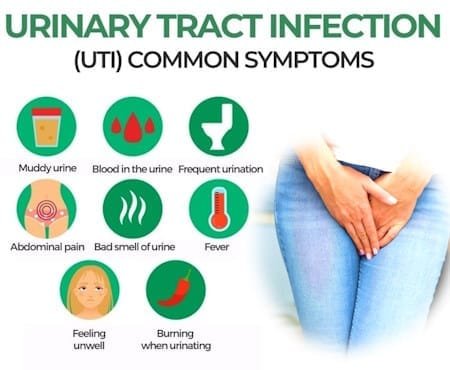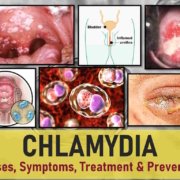Urinary Tract Infection (UTI), Causes, Symptoms, Types and Treatment
What is Urinary Tract ?
Urinary system includes the kidneys, ureters, bladder and urethra. This system helps to remove waste from the body. The kidney filters waste from blood. Tubes called ureters transport these waste products, or urine, from the kidneys to the bladder, where it is stored until it is expelled from the body through the urethra. All these components can become infected, but most infections involve the lower tract.
Urinary tract infection (UTI) ? 
A urinary tract infection or UTI is an infection that can occur anywhere along the urinary tract. Depending on what part of the tract is infected, UTI is named differently. Most urinary tract infections are caused by bacteria Escherichia coli (E. coli), a type of bacteria commonly found in the gastrointestinal (GI) tract (especially the rectum). However, sometimes other bacteria are responsible.
Why do urinary tract infection, UTI affect women ?
Urinary tract infections UTIs are one of the most common clinical bacterial infections in women, accounting for nearly 25% of all infections. Around 50–60% of women develop UTI in their lifetimes. Adult women are most commonly affected as their urethra is shorter than men and opens closer to the anus, making it easier for bacteria to enter the urinary system and cause an infection.
Women are more likely to get an infection if they:-
- have had a UTI before
- have had several children
- have diabetes
- are obese
- have any kind of surgery.
- Menopause also heightens the risk of developing a UTI. During menopause, estrogen levels decline. This decline can prompt changes in the tissues surrounding the urethra, potentially leading to a UTI.
- UTIs can also occur during pregnancy. If you are pregnant and suspect you have a UTI, be sure to inform your doctor promptly. If untreated, it may cause problems for you and your baby.
How do urinary tract infections (UTIs) develop ?
Most urinary tract infections start in the lower urinary tract, which is made up of the urethra and bladder. Bacteria from the bowel live on the skin near the anus or in the vagina. These bacteria can spread and enter the urinary tract through the urethra. If they move up the urethra, they may cause a bladder infection (called cystitis). Bacteria that have infected the bladder may travel to the upper urinary tract, the ureters and the kidneys. An infection of the kidneys is called pyelonephritis. An upper urinary tract infection may result in a more severe illness compared to a lower urinary tract infection.
Types of urinary tract infection, UTI
Types of urinary tract infections include:
- Cystitis is infection of the bladder,
- Urethritis affects the urethra (the tube that empties urine from the bladder to the outside).
- Pyelonephritis is a serious condition caused by kidney infection.

Urinary tract infection, UTI symptoms
A feeling of pressure in the lower pelvis or lower back ache. There may be stinging, painful or frequent urination with urgent urge to urinate often with little or no urine passed. Often there is a need to urinate at night and the urine may also become cloudy or smell unpleasant. Blood in the urine and fever can also occur along with nausea, vomiting, chills and fever indicating a severe infection.
If you experience any of these symptoms, it’s important to inform your doctor immediately. Kidney infections are serious. They need to be treated promptly.
Symptoms associated with a UTI, such as painful urination, can sometimes be attributed to other issues, such as an infection of the vagina or vulva. Tests may be necessary to confirm the diagnosis. Be sure to let your health doctor know if you have any of these symptoms.
Recurring Urinary tract infection (UTI) in women
Your body’s reduced ability to resist bacteria getting into the bladder and causing infection may increase the susceptibility to infections. Sexual activity can elevate the risk of cystitis in certain women. Your vagina, bladder and urethra can be influenced by the hormone oestrogen. After menopause the levels of oestrogen in the body reduce and the tissues become thinner, weaker, and dryer, increasing the risk of recurrent cystitis. Infections are also more prevalent during pregnancy due to alterations in the urinary tract. In many cases there is no apparent cause.
Higher risk patients ?
Old age, being female and post some surgical procedures can increase the risk of infections. Diabetes increases the risk. Surgeries that are done on or near part of the urinary tract and immobilization after surgery will also increase the risk.
Urinary tract infection diagnosis
Testing of the urine may reveal pus cells or red blood cells.
- A urine specimen is necessary to identify the type of bacteria present in the urine and determine the appropriate antibiotic for treatment.
- You may be advised an ultrasound scan to check your kidneys, ureters and bladder.
- If you are suffering from recurrent urinary infection you may be advised to have a cystoscopy in which the inside of your bladder is examined using a camera.
When Should I See a Doctor for a UTI?
Call a healthcare provider if you have symptoms of a UTI. If you’ve been diagnosed with a UTI and your symptoms worsen, contact them again as you may need a different treatment.
When Should I Go to the ER?
Go to the emergency room if you have a UTI and develop any of the following symptoms:
- Fever
- Back pain
- Vomiting
How to reduce risk of UTI ?
These simple measures can reduce the risk of urinary tract infection:
- Drink about 8 glasses of water daily.
- Cranberry juice and vitamin C.
- Do not let the bladder get too full. Pass urine regularly when you feel the need.
- After using the toilet, always wipe from front to back.
- Avoid irritants such as vaginal deodorants, perfumed bath oils, soap or talcum powder around genitals.
- Cleanse your genitals daily but not too frequently or vigorously.
- Go to the bathroom before and immediately after having sex.
- Lubricate adequately during sexual intercourse.
- Wear cotton underwear and loose-fitting clothes to allow air to keep the area dry.
- If you have diabetes, ensure you maintain control over your blood sugar levels.
Urinary tract infection, UTI Treatments
To treat a urinary tract infection, consult a healthcare provider for proper diagnosis and medication. Treatments include:
- Antibiotics: UTIs are typically treated with oral antibiotics. However, if the bacteria are resistant to multiple antibiotics or if the UTI is severe or complicated (such as one affecting the upper urinary tract), intravenous antibiotics may be necessary. Complicated or multi-resistant UTIs may require longer treatment durations compared to acute, uncomplicated UTIs. Doctors often prescribe the following antibiotics to treat UTIs. For complicated or multi-resistant UTIs, prolonged treatment may be necessary.
- Nitrofurantoin
- Sulfonamides (e.g., sulfamethoxazole/trimethoprim)
- Amoxicillin
- Cephalosporins (e.g., cephalexin)
- Doxycycline
- Fosfomycin
- Quinolones (e.g., ciprofloxacin or levofloxacin)
- Over-the-Counter Remedies: Sodium citrate or potassium citrate may help alleviate symptoms.
- Hydration: Drinking plenty of water helps flush out bacteria.
- Recurrent Cystitis: If you suffer from recurrent cystitis you may need a low dose of an antibiotic regularly for a longer period of time.
- Treatment of Underlying Conditions : For recurrent UTIs, your doctor may recommend further investigations to identify possible causes such as diabetes or kidney stones. Treating the underlying cause is important for preventing future infections. For women experiencing UTIs after sex, measures to reduce risk include using adequate lubrication, voiding immediately after sex, and applying topical vaginal estrogens, especially for peri- and post-menopausal women with atrophic vaginitis.
What Vitamins are Good for Urinary Tract Infections?
Vitamin C: There is evidence that Vitamin C may reduce the risk of developing urinary tract infections (UTIs). For prevention, consider taking 100 mg daily. At the first sign of symptoms, a common regimen is to take 2,000 mg daily in divided doses (e.g., 1,000 mg in the morning and 1,000 mg in the evening), for 5-6 days.
In addition to Vitamin C, the following vitamins can help support UTI prevention and recovery:
- Vitamin D: Boosts immune function, helping to prevent UTIs.
- Vitamin A: Maintains healthy mucous membranes in the urinary tract.
- Vitamin E: Acts as an antioxidant, reducing inflammation.
- B Vitamins (B6): Supports immune health and helps reduce inflammation.
Frequently Asked Questions (FAQs)
Can a UTI Go Away on Its Own?
Minor urinary tract infections can sometimes improve on their own, but most require antibiotics. You definitely need antibiotics if you have a UTI accompanied by:
- Fever
- Chills
- Nausea and vomiting
How Soon After Treatment Will I Feel Better?
A urinary tract infection can be uncomfortable and painful, but can easily be treated with antibiotics. Most people feel better within a few days after starting antibiotics for a UTI.
Cephalexin or Cefdinir for UTIs, which to choose?
Both Cephalexin and Cefdinir are antibiotics used to treat UTIs, but the choice depends on factors like the specific bacteria causing the infection and individual patient characteristics. Cephalexin is often prescribed as a first-line treatment for uncomplicated UTIs, while Cefdinir may be used for more resistant infections. Always consult with a healthcare provider for the most appropriate antibiotic choice.
Do urinary tract infections cause bloating?
Yes, UTIs can cause bloating in some individuals. The inflammation and irritation in the urinary tract can lead to discomfort and a feeling of fullness in the lower abdomen. However, if bloating persists or is severe, it’s important to consult a healthcare provider as it could indicate a more serious condition or the spread of the infection to the kidneys.
Does apple cider vinegar help urinary tract infection?
While some people claim apple cider vinegar can help with UTIs, there’s limited scientific evidence to support its effectiveness. Apple cider vinegar is acidic and may create an unfavorable environment for bacteria, but it’s not a substitute for proper medical treatment. If you have a UTI, it’s crucial to seek professional medical care and use prescribed antibiotics.
Can BV cause urinary tract infection?
Bacterial Vaginosis (BV) doesn’t directly cause UTIs, but it can increase the risk. BV alters the vaginal microbiome, potentially allowing harmful bacteria to grow and spread to the urinary tract. Both conditions share some symptoms, so it’s important to get an accurate diagnosis from a healthcare provider to ensure proper treatment.
Can you have a urinary tract infection and a yeast infection at the same time?
It’s possible to have a UTI and a yeast infection simultaneously, as both can occur due to disruptions in the body’s natural balance of microorganisms. While they are distinct conditions with different causes and treatments, some symptoms may overlap. If you suspect you have both, consult a healthcare provider for proper diagnosis and treatment, as each condition requires a specific approach.
Can flagyl treat a urinary tract infection?
Flagyl (metronidazole) is not typically used to treat UTIs. It’s primarily effective against anaerobic bacteria and certain parasites, while most UTIs are caused by aerobic bacteria. Standard UTI treatments usually involve other antibiotics like trimethoprim-sulfamethoxazole, nitrofurantoin, or certain cephalosporins. Always consult with a healthcare provider for appropriate UTI treatment.
Can a UTI affect your period?
Yes, a UTI can potentially affect your menstrual cycle. The stress and inflammation caused by the infection may disrupt hormonal balance, which could lead to changes in your menstrual cycle. However, it’s important to note that while this is possible, it’s not a guaranteed effect for everyone with a UTI.
Can lichen sclerosus cause UTI symptoms?
Lichen sclerosus, a chronic skin condition affecting the genital and anal areas, can sometimes cause symptoms similar to a UTI. These may include burning, itching, and pain during urination. However, lichen sclerosus doesn’t cause an actual urinary tract infection. If you’re experiencing persistent UTI-like symptoms, it’s important to get a proper diagnosis from a healthcare professional.
Does UTI cause bloating and back pain?
Yes, a UTI can cause bloating and back pain, particularly if the infection has spread to the kidneys. Bloating may occur due to inflammation in the urinary tract, while back pain (especially lower back pain) can be a sign that the infection has reached the kidneys. If you’re experiencing these symptoms along with other UTI signs, seek medical attention promptly.











